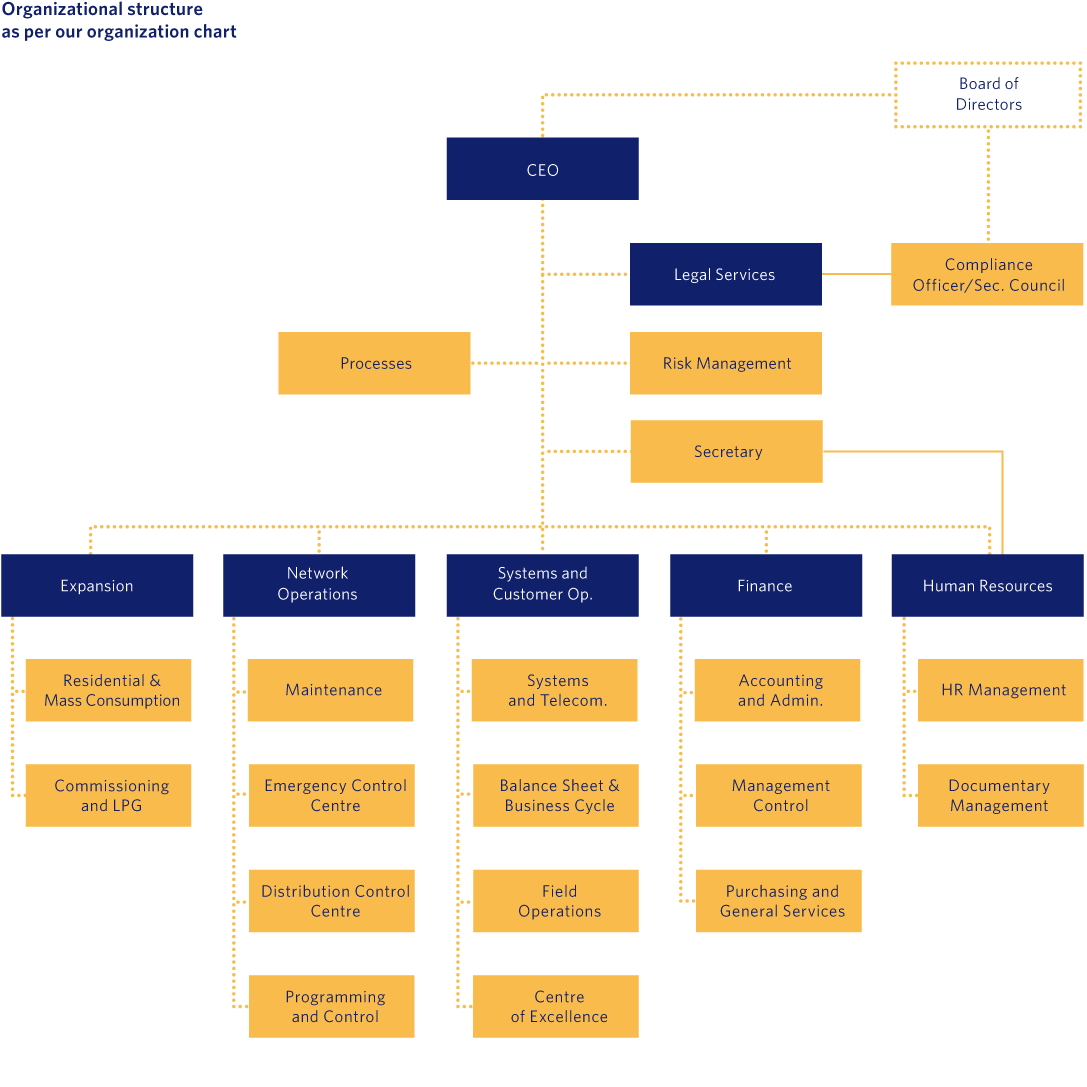
3.1 Organisational structure
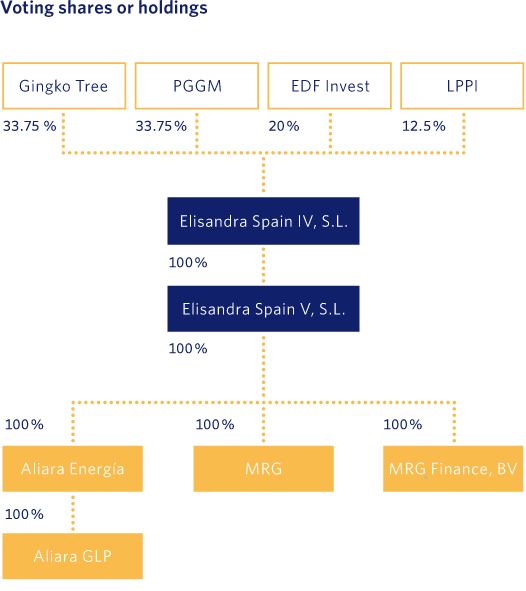
Our structure is reviewed periodically, and is adapted to the strategic, organisational and process needs demanded by our Strategic Plan. The structure for the year-end December 2023, which is the same as in September 2022, is shown below. Organisational changes resulting from the strategy of the Expansion Division will be reflected in the next financial year.
Elisandra Spain V, S.L.U., our sole shareholder, is controlled by the parent company Elisandra Spain IV, S.L. In turn, the latter is linked to four main investment groups and business partners with different shareholdings and voting rights: Realgaz, S.A.S (EDF Invest), Stichting Depositary PGGM Infrastructure Funds (PGGM), JCSS Mike S.A.R.L. (Gingko Tree) and LPPI Infrastructure Investments LP (LPPI). In order to reinforce the separation and transparency of our regulated gas-distribution activities from other activities, a set of independent companies has been created, with Elisendra Spain V, S.L.U. holding the entire capital.
3.2 Sustainability Governance
The governance structure comprises the Board of Directors, the Audit and Risk Committee, the Remuneration Committee and the Management Committee. The four partners of Elisandra Spain IV, S.L. are represented on all of them.
The main element governing the appointment of our governing bodies is the representation of our shareholders in a large part of these control bodies, thus providing a mechanism of control and independence in decision-making. Moreover, in line with our code of ethics and our commitment to diversity, we do not discriminate on the basis of age, gender, origin, religion, etc. However, due to the history of our company, and the gas sector in general, there is still a male majority on our governing bodies, although we are working to narrow the gap.
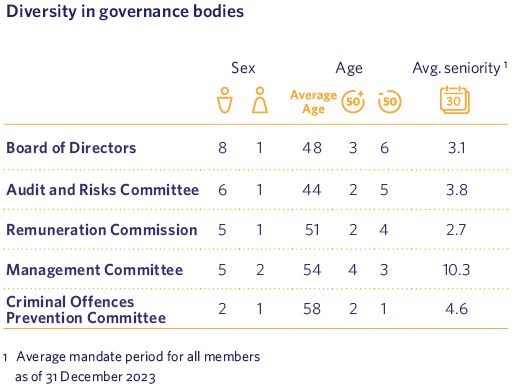
In addition to this structure, there are a number of Committees and Commissions of which members of the Management form part, providing support to the responsibilities of governance at a technical level. These include:
- GIS Committee
- Cybersecurity Committee
- Crisis Committee
- Health and Safety Committee
- Major Accident Prevention Committee
- Works Council
- Code of Ethics Commission
- Equality Plan Monitoring Committee
- Pension Plan Monitoring Committee
Board of Directors
The Board of Directors is the form of management body established in the Articles of Association entered in the Commercial Register and acts as a collegiate body. Its members, individually, are all non-executive proprietary directors, as opposed to the Management Committee, which includes executive members. The system for the selection and appointment of Board members is expressly regulated in the Articles of Association and in the Board of Directors’ Regulations. It should be noted that four new Board members have been appointed during 2023, replacing the corresponding directors of their respective companies.
The Board is a collegiate body, so there are no significant positions beyond the existence of a Chairman of the Board. Its resolutions are implemented by the Chief Executive Officer of the Company, the only person who, together with the Chief Financial Officer and the Finance Department, has general management, administrative and decision-making powers. Its operation is governed by the Articles of Association and by the commitments, rights and obligations established in the Capital Companies Act.
As part of our commitment to advance in the implementation of best corporate governance practices, and recognising the value and importance of a diverse and balanced composition on the Board of Directors, a new female director joined the Board of Directors in 2022, ensuring the existence of appropriate procedures for the selection of directors and also seeking a balance in the higher bodies of the organisation.
Board members are proposed by the Board of Directors itself and their appointment is accepted by the sole shareholder, in accordance with legal provisions. The members are proposed by the various investors, most of whom are members of the Boards of other organisations in their shareholding group, there are no independent members, and the term of office is six years. The average term of office is currently 3.1 years.
As regards the professional profile of the Directors on the Board, they are professionals especially qualified for their role, with extensive professional experience and having held positions of high responsibility in functions related to those entrusted to them, thus meaning that all the Directors on the Committee have a proven ability to perform the functions entrusted to the Committee due to their extensive experience and knowledge.
Currently, in line with best corporate-governance practices and the new requirements in terms of sustainability and GRI standards, we have a matrix of competencies of the Board of Directors, individualised by Director, which reflects the competencies, experience, training and level of knowledge.
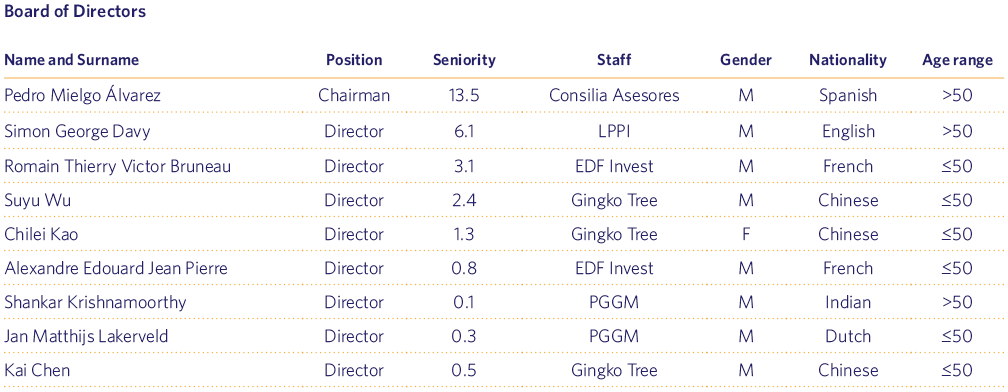
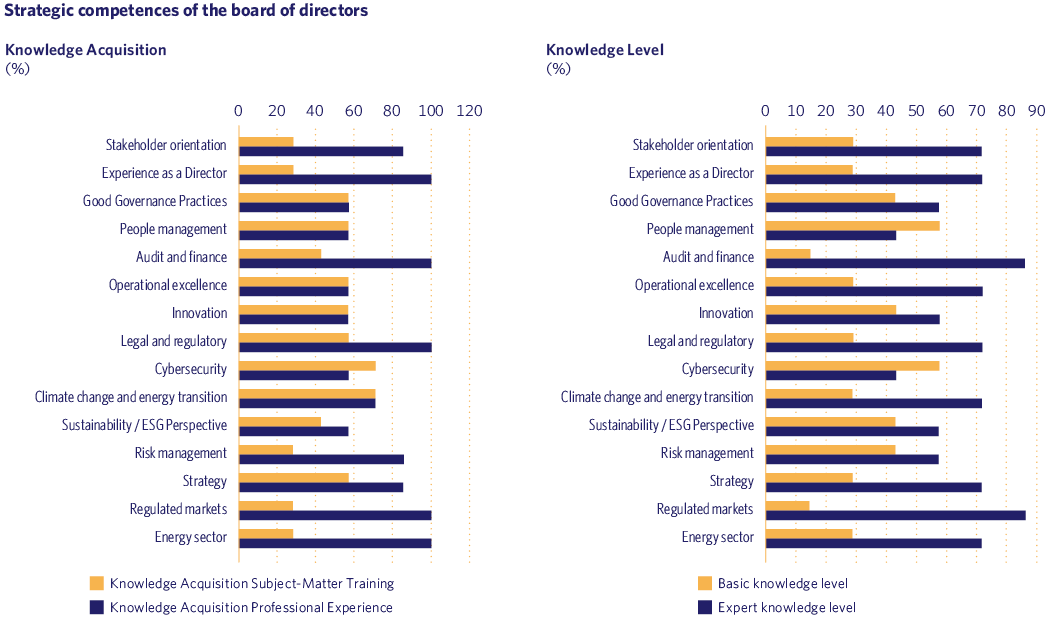
The matrix consists of three blocks:
- Competencies: a total of 15 core competencies are assessed for the sector and our company’s strategic priorities, as well as new knowledge needed to take action on sustainability impacts, risks and opportunities.
- Acquisition of knowledge, professional experience in that field is assessed, as well as whether specific training is available.
- Level of knowledge: to facilitate the assessment of the level of competence, 3 levels have been established:
- Expert: Master’s level or at least three years working on these issues.
- Basic: Has basic training in the field or less than three years working on these issues.
This matrix will be reviewed periodically (at least every two years) or when there are changes in the composition of the Board of Directors, or changes in the strategic priorities of the company.
Main responsibilities of the Board of Directors
The Board of Directors, as the highest governance body, defines the Company’s overall strategy, validates management strategies and objectives, and monitors the organisation’s performance in terms of the economy, the environment and people. The organisation’s processes are, in turn, defined by the company’s Management Committee and communicated to the Board of Directors insofar as there may be a relevant change. The Secretary of the Board is responsible for communication between the Directors and the Management Committee, channelling all communications and notifications addressed to the Directors.
Mission, Vision and Values statements are defined and reviewed by our Management Committee and communicated to, and approved by, the Board of Directors. Likewise, policies, strategies and objectives related to sustainability issues (economic, environmental and social- and human-rights due diligence, including analysis of material issues) are defined by the Risk area, approved by the Audit and Risk Committee (Audit and Risk) and subsequently reported to the Board of Directors for validation, as part of management. The entire sustainability reporting function, and its subsequent verification, has been delegated to the Audit and Risk Committee, and is finally validated by the Management Committee and presented to the Board of Directors.
Meetings of the Board of Directors are held at least quarterly. Preliminary dates and agendas are set in December each year and approved by the Board to provide greater certainty about the minimum number of meetings and the content to be discussed and analysed a year in advance.
Based on this initial agenda, which can be modified according to circumstances and singular events that may occur, the directors of each area, the members of the management committee and the various committees in the company prepare detailed analyses to be presented to the Board at each of its meetings, from the standpoint of the environment, people and the economy. The Board of Directors discusses these issues and takes any necessary decisions.
Given we are fully aware of the effects of climate change and the energy transition on our business at present and in the near future, as well as the impact on the economy, the environment and people of our activity, and the new reporting requirements, these have been integrated as systematic elements to be assessed by our Board of Directors. Our commitment to sustainability has materialised in a clear commitment to a business strategy that promotes sustainable development in the medium and long term.
Over these past three years, we have consolidated the integration of sustainability into our corporate governance and business decision-making. The Board of Directors oversees and approves decisions and progress on sustainability, delegating executive functions to the Audit and Risk Committee. At its meetings, the results of the period presented by the Management Committee are analysed in order to monitor and define strategies, the progress of activities, matters of relevance to the organisation, risks and opportunities arising from impacts on the economy, the environment and people, the opinion of stakeholders, and, at the request of members, detailed information is provided on all matters deemed relevant. This year, in line with its concern for a progressive approach to the SFDR requirements, and in relation to expectations / materiality of the various topics of interest, ad hoc meetings have been held with PGGM, informing and training on the approaches, methodologies of dual materiality and progress in the development of requirements of Madrileña Red de Gas to respond to the new GRI and CSRD requirements, which have been very positively valued.
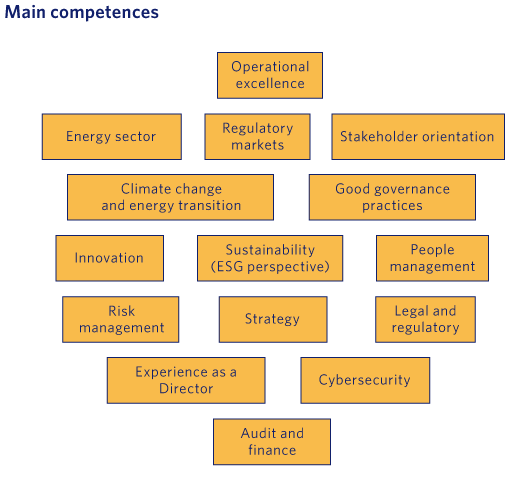
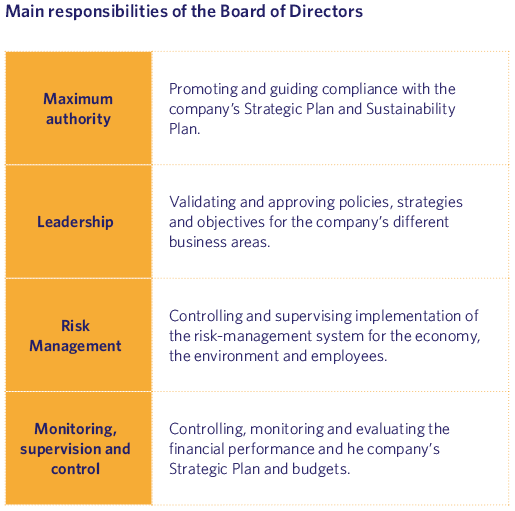
Immersive sessions on sustainability promoted by the Board were held in June and November 2023, where progress and results were presented, and decisions were taken in relation to strategic elements regarding the company’s sustainability, such as: the carbon footprint (including scope 3), MRG’s contribution in relation to fugitive carbon emissions, the Net Zero strategy and its reduction plan, assessment of climate change, as well as responding to the sustainability requirements of our shareholders.
In addition, in the context of the Audit and Risk Committee, the challenges and commitments related to sustainability and our Sustainability Master Plan are monitored, reporting on the progress achieved, as well as presenting proposals to the Board of Directors for formal approval, if necessary.
The control and evaluation of the financial performance of the highest governance body is carried out by way of the annual year-end accounts audit, which, in compliance with Law 11/2018 on Non-Financial Information and Diversity, provides non-financial information verifiable by an independent third-party.
In addition, in 2023, proposals have been presented and analysed within the Board to improve the Board’s performance-evaluation process by way of internal self-evaluation and an external verification to be undertaken in subsequent years.
In this market context, where our shareholders and investor groups seek to invest in sustainable and socially responsible companies, it should be noted that, in 2023, we have improved the average cost of debt, reaffirming our commitment to sustainability through the loan linked to the score obtained in the GRESB sustainability index, the result of which has been a success for our company and for our shareholders and investor groups, who establish, supervise and set guidelines in the new challenges in terms of sustainability that we have in the short and medium term.
The Board of Directors is an unpaid body, as provided for in the Company’s Articles of Association.
Three control bodies have been established within the Board, the Audit and Risk Committee, the Remuneration Committee and the Committee for the Prevention of Criminal Offences, all of which have specific tasks, on which they report to the Board.
Audit and Risk Committee
The Audit and Risk Committee (ARC), which comprises members of the Board of Directors, the Management Committee and the Head of Risk Management, monitors corporate risks and identifies, analyses and assesses their impact on the economy, the environment and people. In line with the addition of new Board members, two new members have been appointed to our ARC Committee.

At the proposal of the Steering Committee, any threat with potential impacts on the economy, the environment and people may be subject to analysis to determine the likelihood and magnitude of the impact, as well as to define the corresponding mitigation plan.
At Madrileña Red de Gas, we have defined and implemented a process for determining the double materiality of aspects related to sustainability that involves and promotes the participation of interested parties and in which the perception of the organisation’s performance in each of the material aspects is compiled. This sustainability report includes the results of this analysis from a dual materiality perspective, which is endorsed and approved by the Board of Directors.
As set out in our internal rules of procedure, the Audit and Risk Committee reports directly to the Board of Directors and operates in accordance with the rules of procedure, which define its objectives, functions and composition. This committee comprises representatives of the Board of Directors of each of the four shareholders, several members of the Management Committee and the Risk Management Department.
The contents of the agenda are discussed at regular committee meetings, which are held prior to each Board meeting, and are agreed internally at the beginning of each new financial year.
The Audit and Risk Committee is responsible for:
- Supervising and controlling processes, channelled through the SIG Committee.
- Presenting the results of the audit and external verification.
- Monitoring the effectiveness of the internal control and risk-management system.
- Follow-up of the criminal offence prevention policy and monitoring the compliance system.
- Developing and updating the Mission, Vision, Values, Policies, which are subsequently approved by the CEO and presented to the Board of Directors.
- Developing and monitoring the Sustainability Master Plan.
- Monitoring relevant issues and objectives related to Sustainable Development, as well as the organisation’s due diligence, to address and manage impacts.
- Preparing and presenting the sustainability report, which is presented to, and validated by, the Management Committee and the Board of Directors.
The most recurring matters include monitoring of the corporate risk map (including operational, technological, regulatory, economic, social and environmental risks, as well as those arising from climate change, cybersecurity and reputational risks), the controls and mitigation plans established or proposed, the auditing of accounts, audits of the integrated prevention system, environment, quality and information security, sustainability-related aspects, development and monitoring of the Sustainability Master Plan, ESG scoreboard, adaptation to new sustainability reporting requirements, annual monitoring of the criminal offence prevention policy and monitoring of the compliance system. The outcome of these activities enables us to issue recommendations to risk management and/or the Board of Directors.
Remuneration Committee
Shareholder involvement in the remuneration of senior executives is carried out via the Remuneration Committee, which comprises the Chairman of the Board and up to four Board members. As with other Committees, given the change of Directors on behalf of our shareholders in 2023, this Committee has also added three new members.

The meetings are attended by the Director General and the Head of HR, except when their own remuneration is under discussion. Senior management is defined as the CEO, whose remuneration is determined annually by the Remuneration Committee. The directorships are non-remunerated, as set out in the Company’s Articles of Association (see above).
The Remuneration Committee determines and recommends to the Board of Directors the remuneration policies and any changes to the terms and conditions of service of the CEO, CFO and any other members of management, as appropriate, or other employees.
It is responsible for all elements of remuneration of MRG Unit Managers, these being:
- Fixed remuneration: the amount paid based on the level of responsibility and career path. It is accrued in any case. Any update is proposed and agreed annually by the Remuneration Committee.
- Variable remuneration: the amount paid on the basis of the objectives achieved within a time horizon of one year. Targets are defined annually by the Remuneration Committee and payment is approved on the basis of performance in the following year. The objectives are aligned with shareholders and society as a whole (part of the objectives are related to different sustainability aspects of the company).
- Recruitment bonuses or recruitment incentive payments.
- Compensation for termination of the contract: this is the monetary compensation that the employee would receive in the event of termination of their contract and is stated in the contract.
- Reimbursements.
- Retirement benefits: A provident scheme set up with the aim of articulating a system of social benefits complementary to those of the public pension system, in the interest of its participants.
The Committee has the duty to agree the principles and structure of the remuneration proposal for all Board and Management Committee members not covered by a Collective Bargaining Agreement (CBA), to think about how to attract, retain and develop talent together with the CEO, and to establish succession plans and review them.
The principles on which retribution is based are:
- long-term value creation.
- attracting, retaining and motivating the best professionals.
- rewarding the level of responsibility and results.
- ensuring internal equity and external competitiveness.
- ensuring equal pay for men and women.
Our remuneration policies for all our employees are in line with good corporate-governance practices, in accordance with the provisions of article 7 of Royal Decree 902/2020, and we have carried out a remuneration audit in accordance with the Equality Plan (2022–2026). The action plan is contained in the Measures section of the Equality Plan, specifically in the “Remuneration” block, and is monitored through follow-up of the Plan (see People chapter).
The Remuneration Committee meets with the appropriate frequency for the correct performance of its functions (at least once or twice a year), although it may increase the frequency when deemed necessary. The Commission’s proposals are forwarded to the Board of Directors.
In line with our commitment to sustainability, our sustainable financing and the requirements of our shareholders, over the last three years part of the variable remuneration of management and other staff has been linked to our performance in sustainability systems and objectives, such as the GRESB index.
Management Committee

The Management Committee is a body comprising the Managing Director or CEO of the Company and the heads of the six Unit Divisions. The Unit managers oversee people with considerable experience and skills in the main areas of activity of our company, proposing to the Committee the operational and management proposals they consider appropriate or necessary for their respective Units and for the fulfilment of the Strategic Plan, as well as acting as a channel for transmitting the interests, needs and expectations of our stakeholders. The executive decisions of the Management Committee are taken by the Managing Director or CEO of the Company.
Its main responsibilities are:
- Definition and updating of the Mission, Vision, Values, policies, strategies and objectives, which it transfers to the General Management, in order to comply with the Company’s strategic plan, and monitoring of the same.
- Approval and monitoring of the Sustainability Master Plan, and the objectives related to sustainable development.
- Monitoring the overall performance and specific projects of the Company’s operational and business areas: expansion, customer operations and network operations.
- Overall monitoring of compliance with economic, environmental and social performance targets.
- Participation and involvement with stakeholders within the scope of their competencies, delegating the systematic and periodic identification of interests, needs and expectations carried out by the organisation to the Risk Area.
- Identification of risks and opportunities, assessing impacts on the economy, the environment and people. Definition of risk-mitigation policies and plans, as well as their monitoring.
- Definition of performance objectives by processes and supervision of the evolution of the Company’s scorecard of management indicators. Proposal and implementation of improvement actions.
- Monitoring of the various corporate issues with cross-cutting implications that are considered relevant (regulation and legal compliance, sustainability, human resources, health and safety, environment, personal data protection, prevention of criminal offences, etc.).
The objectives and operating procedures of the technical committees and commissions identified in this chapter are set out throughout the report, according to their area of work or scope.
3.1 Ethics and compliance model
The systematic identification of compliance obligations, risk analysis and the implications that these have for the activities, products and services of Madrileña Red de Gas, both for compliance with the strategic plan and for minimising legal and criminal risks, are the driving forces behind the development, implementation and improvement of a solid compliance system and the promotion of a culture of compliance and due diligence.
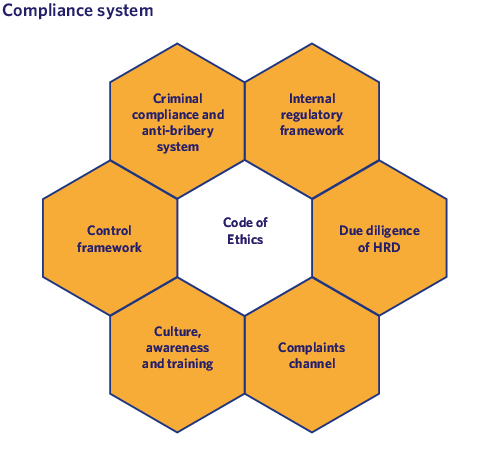
The legal compliance of the integrated management system is carried out through a systematised process of identification and evaluation of legal requirements, supported by an IT tool. In addition, compliance controls and measures are established through internal regulations, and the risks arising from legal non-compliance are assessed in all areas of the company.
At Madrileña Red de Gas, we provide the tools available to all its members and its supply chain to promote the highest ethical and compliance standards, respect for current legislation and regulations, as well as zero tolerance towards activities related to corruption or other illicit activities.
In 2023 there were no fines or penalties resulting from legal non-compliance.
The main axes of our Compliance System are described below.
Code of Ethics
Our Code of Ethics provides a guide to the people who make up Madrileña Red de Gas, determining the ethical values, principles and guidelines for conduct that must govern their activity within the company. Madrileña Red de Gas has integrated corporate responsibility into its strategy and positioning as part of our values. We realise that the Company’s acceptance and economic success can only be sustainable if it makes an active, credible and tangible contribution to the outcome of the challenges facing our society. Thus, as a means to achieve these results, the Management of Madrileña Red de Gas establishes criteria for good governance of the Company and a Code of Ethics and mandatory policies for all employees. All documents are regularly disseminated and made available online. It is also part of the welcome pack for new employees.
The purpose of our Code of Ethics is to establish the guidelines that will guide the ethical behaviour of all our employees in their daily performance, with regard to their relations and interactions with all their stakeholders, i.e. employees, customers, suppliers and external collaborators, shareholders, public and private institutions and society in general.
The Code of Ethics is addressed to all our staff, irrespective of their position or the place where they work.
The entry into force of Law 2/2023, of 20 February, regulating the protection of persons who report regulatory infringements and the fight against corruption, and the revision of our whistleblowing channel, has led to a revision of our Code of Ethics.
We also promote and encourage our suppliers and collaborating companies to adopt behavioural guidelines consistent with those defined in this Code of Ethics, for which a Supplier Code of Conduct has been developed. The Code of Conduct has been reflected in the new contractual clauses.
The Code of Ethics Committee is the body that oversees compliance with the Code. It is made up of four members appointed by General Management given their experience and knowledge, in addition to the person responsible for the Internal Information System, who will elect the Chairman of the Committee by vote for a two-year period. Its functioning is regulated in the Code of Ethics itself.
The purpose of the Code of Ethics Commission is to:
- Promote the dissemination, knowledge and compliance with the Code of Ethics.
- Interpret the Code of Ethics and guide actions in case of doubt.
- Facilitate the resolution of conflicts related to application of the Code of Ethics.
- Facilitate and manage a channel of communication for all employees, suppliers and collaborating companies to carry out consultations or communicate breaches of the Code of Ethics, or any other related information, in good faith and without fear of reprisals.
- To report to the Governing Bodies on the dissemination of, and compliance with, the Code of Ethics, as well as on the activities of the Committee itself, preparing appropriate recommendations or proposals to keep it up to date, improve its content and facilitate the application of those aspects that require special consideration.
- To ensure compliance with the Code of Ethics and, where appropriate, to analyse indications and complaints relating to possible breaches of the Code.
The Commission shall submit its proposals to the CEO for approval.
Internal regulatory framework
The principles underpinning our corporate governance and compliance system are embodied in a set of regulations, policies, rules, standards, manuals and procedures.
Firstly, our by-laws are in line with best practice in corporate governance, setting out the rules of organisation and operation, rules of conduct, and the mechanisms for supervision and control of our governing bodies:
- Articles of association, registered in the Commercial Register, govern the general functioning of the company.
- Rules of Procedure of the Board of Directors
- Rules of Procedure of the Audit and Risk Committee
- Remuneration Committee Rules of Procedure
This Code of Ethics is inspired by the definition of the Mission, Vision and Values of Madrileña Red de Gas, which it complements, and constitutes a model of action to ensure appropriate behaviour in the professional performance of our employees.
Our values are reflected in our Mission, Vision and Values which were reviewed in 2022, validated by the Audit and Risk Committee, and approved by the CEO.
Our policies reflect our values, principles and commitments to correct business conduct, reinforcing our involvement in the short, medium and long term with economic, environmental, social and good-governance sustainability, and also delve into the impacts and risks related to our activity and lay the foundations for an adequate awareness, involvement and management of these, both by employees and shareholders, as well as by our value chain, and govern the relationship with the different stakeholders. These policies are accessible on the web for all our stakeholders: “https://madrilena.es/sostenibilidad/”.
These policies are defined by the relevant management, supervised by the Audit and Risk Committee, approved by the Chief Executive Officer and ultimately validated by the Board of Directors to ensure compliance and supervision.
Human Rights Due Diligence
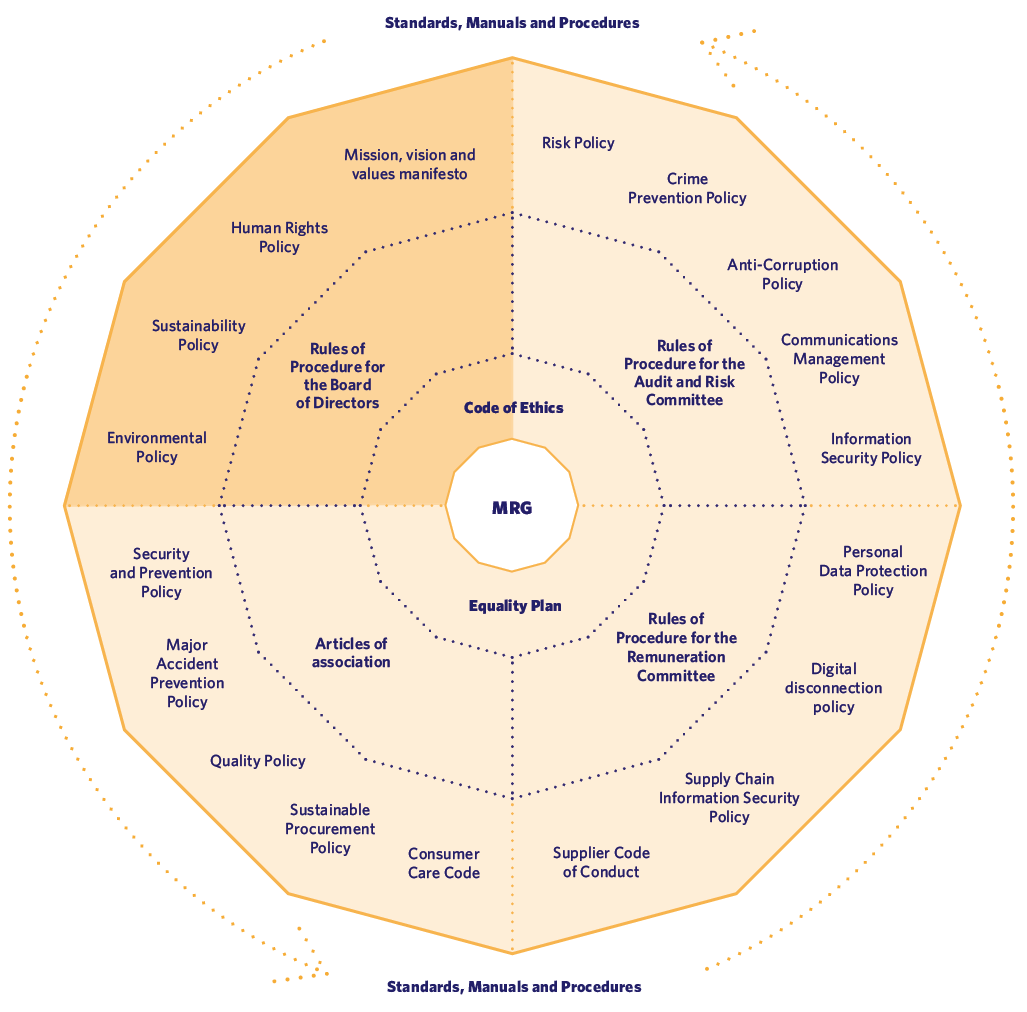
At Madrileña Red de Gas we have developed a Human Rights Policy, as a guiding principle that governs our behaviour and strengthens our commitment to respect and promote Human Rights in all our operations, our value chain and all the communities where we carry out our activity, paying special attention to vulnerable groups. This commitment is extended to suppliers through the Sustainable Procurement Policy and the Code of Conduct for suppliers, as well as contractual specifications on working conditions and legal compliance.

This Due Diligence Policy is based on the following elements, which allow us to assess potential impacts on compliance with the principles of respect for Human Rights.
Our Policy follows the recommendations and rights recognised in:
- The United Nations Universal Declaration of Human Rights
- The United Nations Global Compact
- The United Nations International Covenant on Economic, Social and Cultural Rights
- The United Nations International Covenant on Civil and Political Rights
- The core conventions of the International Labour Organisation (ILO)
- The United Nations Convention on the Elimination of Discrimination Against Women (CEDAW)
- The Guide to the UN Guiding Principles on Business and Human Rights
- The UN Convention on the Rights of the Child
- UN Convention on the Rights of Persons with Disabilities
- The European Directive on Due Diligence of Companies and Corporate Responsibility
- The 2030 Agenda for Sustainable Development
Our Human Rights Due Diligence Model is based on our risk-management model and our impact analysis in the dual materiality process, where we identify potential impacts on compliance with the principles of respect for Human Rights.
This Model is based on the principles of protection, respect and remediation, aimed at fulfilling the commitments set out in this policy and the behaviours set out in our Code of Ethics. To this end, it has established the following review mechanisms:
- The Board of Directors is responsible for approving and supervising the Company’s overall Human Rights strategy, from which this Policy is derived.
- The Risk Manager is responsible for the Human Rights risk assessment, reporting to the Audit and Risk Committee.
- The Audit and Risk Committee is periodically informed about the implementation and performance of this Policy and the Code of Ethics by the whole Organisation, in order to monitor and assess the degree of implementation and effectiveness of the Policy for managing the protection of Human Rights.
- At Madrileña Red de Gas we have implemented communication and whistleblowing channels to ensure that any possible irregularities, including human rights violations or abuses, are dealt with and remedied.
Our policy was approved by the General Meeting in 2022 and applies to all employees, management and the Board of Directors and covers all activities carried out by our company. Compliance is ensured through the evaluation mechanisms of the compliance system.
Given our regulated activity and the geographical environment in which we operate, there is no high risk of non-compliance. However, at Madrileña Red de Gas, we make the tools available to all our stakeholders (see chapter on sustainability strategy), with special emphasis on the working environment of our supply chain and the supply of gas to people made vulnerable by energy poverty, following the regulations in force in this regard.
Criminal and Anti-bribery Compliance System
Criminal compliance system
Within the framework of the Compliance System, and as a result of the risk analysis in Madrileña Red de Gas, we have defined and communicated internally a Criminal Offence Prevention Protocol framing the functional areas and the most sensitive activities where the crimes to be prevented may be committed. Madrileña Red de Gas is committed to the permanent revision of the protocol based on analysis and control.
To this end, we have a Crime Prevention Committee comprising the Chairman of the Board of Directors, the Chief Executive Officer and the Compliance Officer.

The functions of this Committee can be summarised along the following lines:
- Review existing policies and ensure ongoing compliance with legislative developments in risk prevention
- Adapt the controls in place so that the risks identified are reduced as much as possible
- Review employee-training programmes with regard to new developments or as a reminder
This Committee analyses the actions carried out within the framework of the criminal compliance system, submits the action plans proposed by the Compliance Officer for approval, the improvement initiatives to be implemented during the current year, and the proposals for reviewing the existing crime-prevention policies and the training programmes in this area. In case of non-compliance or specific needs, an ad hoc meeting is convened to discuss the issue in question, to assess the matter and to propose a solution.
The organisational processes corresponding to the more operational part of the company are, in turn, defined by the company’s Management Committee and communicated to the Board of Directors insofar as there may be a relevant change.
The discussions in the Crime-Prevention Committee are passed on to the Audit and Risk Committee and the latter, in turn, to the Board of Directors, which takes note of all impacts. All matters discussed in the Committees, as well as any additional issues that have arisen, are reported and communicated to the Board of Directors for information. With this system of delegation, all impacts that may affect the company in all areas are efficiently managed. At this annual meeting, an assessment is made of the actions carried out within the framework of the compliance system, the action plans proposed by the compliance officer, the improvement initiatives to be implemented during the current year and the proposals for reviewing the existing crime-prevention policies, and the training programmes in this area are submitted for approval. In case of non-compliance or specific needs, an ad hoc meeting is convened to deal with the matter in question, to assess it and to propose a solution.
Preventing corruption and fraud
At Madrileña Red de Gas, we are firmly committed to fighting corruption in all its forms, and to developing specific practices to prevent it. To this end, we have established an Anti-Corruption Policy. In this regard, we declare our public commitment not to influence the will of persons outside the Company to obtain any benefit through the use of unethical practices, and no employee or professional of our company may accept or make, directly or indirectly, payments, gifts or compensation of any kind in an attempt to improperly influence their business, professional or administrative relationships, whether with public or private entities.
The risks associated with any criminal activity within our organisation, including the crime of corruption, fraud or conflict of interest, is overseen by the Board of Directors via the Audit and Risk Committee, which helps to prevent or mitigate such risk to the maximum extent possible. No cases of corruption have been detected to date.
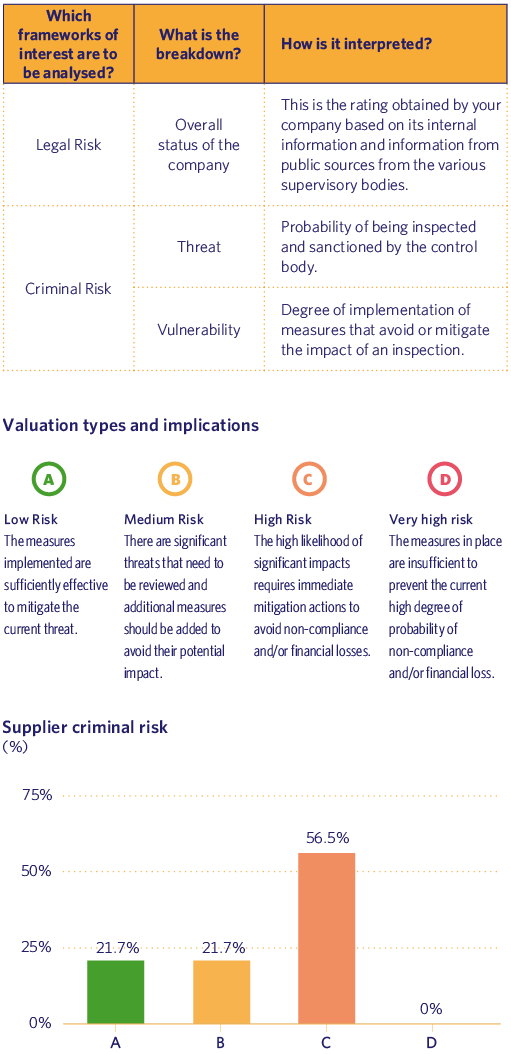
Board members must inform the Board of Directors and the Company itself if they detect a conflict of interest. This communication is documented and included in the Company’s annual report. Likewise, as established in the Spanish Companies Act, for those cases in which a possible conflict of interest is foreseen in the future, article 230 of the same legal text establishes the procedure for exemption in one-off cases, which will be carried out, depending on the case, by the Board itself or, in this case, by the sole shareholder.
No non-compliance has been detected for criminal risks or risks associated with internal and external corruption in 2023.
In addition, criminal clauses on legislative compliance and criminal liability are included in all contracts with suppliers and contractors. These contracts require compliance with legislation at all levels: labour (Occupational Risk Prevention, contributions, compulsory training for the activity, etc.) and business (compliance with the tax authorities, accreditations of activity, etc.).
Monitoring of the ESG performance of our suppliers through the supplier pre-qualification portal, and following our own risk methodology, allows us to assess the current status of our partner companies in different regulatory frameworks, and specifically in the legal and criminal fields.
In the 2023 assessment, 57% of our suppliers were rated as high criminal risk and 0% as very high risk, but only one supplier was rated as critical.
No non-compliance associated with corruption has been detected in our partners and collaborators in 2023.
Complaints channel
Since implementation of the Crime-Prevention Protocol in 2015, MRG has had a Whistle-blower Channel that guarantees the anonymity and indemnity of whistle-blowers, as well as investigation of the acts that may be reported via said channel.
With the entry into force of Law 2/2023, of 20 February, regulating the protection of persons who report regulatory infringements and the fight against corruption, all companies with more than 50 employees are obliged to implement an Internal Reporting System and, therefore, to have a reporting channel.
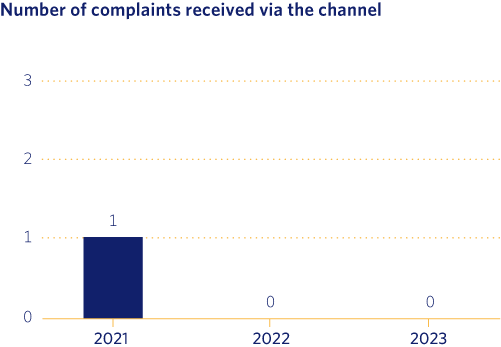
The aim of this internal information channel is to establish a means by way of which members of the Company, and third parties outside the Company, can communicate information regarding possible irregularities that may occur within the Company and manage the internal investigation processes arising from same.
MRG’s internal information system guarantees compliance with the provisions contained in art. 5.2 of Law 2/2023, given that:
- It allows all persons referred to in Article 3 to communicate information on the infringements referred to in Article 2.
- It is designed, established and managed in a secure manner, so as to guarantee the confidentiality of the identity of the informant and of any third party mentioned in the communication, and of the actions carried out in the management and processing of the same, as well as data protection, preventing access by unauthorised personnel.
- It allows communications to be submitted in writing or orally, or both.
- It incorporates the internal information channel, which Madrileña Red de Gas RG has had since 2015.
- It ensures that the communications submitted can be dealt with effectively within the company, with the objective that the first to know about the possible irregularity is the company itself.
- It is separate and distinct from the internal information systems of other entities or bodies.
- It has a system manager, as provided for in Article 8.
- It has a policy setting out the general principles of internal information systems and whistle-blower protection, which will be duly publicised within the company. This policy is the “Irregularity Reporting Policy” document.
- It has a procedure for managing the information received. This procedure is contained in the “Irregularity Reporting Procedure” document.
- It establishes the necessary guarantees for the protection of whistle-blowers within the company itself, respecting, in all cases, the provisions of Article 9 of Law 2/2023.
This project was presented to the Board of Directors by the Compliance Officer and was approved as an action plan for the year 2023. On 30 November 2023, all policies, the aforementioned procedure and the consequent update of the Code of Ethics, were finally approved by the Board of Directors, after mandatory consultation with the Company’s Works Council on 22 November 2023.
This channel is available on the internet (https://www.canaldedenuncias.com/es/madrilena). In 2023, it was available and operational 100% of the time.
Complaints received via the Whistleblowing Channel are discussed and analysed by the Code of Ethics Committee and distributed to the relevant area, with the agreed considerations, according to their content.
There have been no significant cases of non-compliance with laws and regulations and no fines have been paid during the reporting period.
During the past year, no complaints have been registered via the whistleblowing channel regarding possible cases of corruption or the Code of Ethics. Furthermore, our company has not been investigated or convicted by any court of law for non-compliance in corruption-related cases, as in previous years.
In 2023, we received four queries or complaints via the channel related to the company’s normal operations, which were channelled through the appropriate channel for management. As none of them were linked to the compliance system, they were not categorised as complaints.
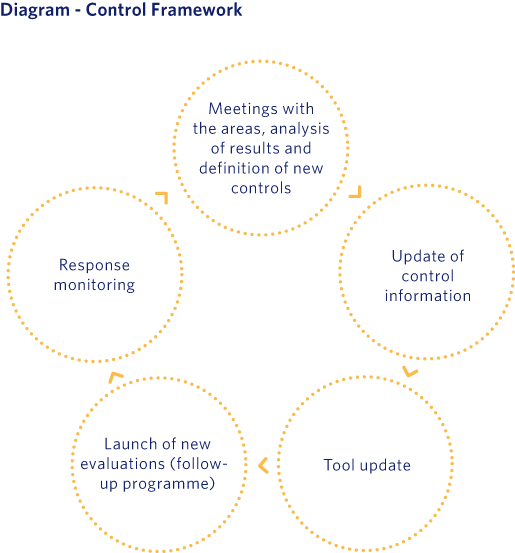
Control framework
Monitoring and evaluation of the compliance programme is carried out on an ongoing basis while activities are being carried out, thus providing a reasonable level of assurance. The control monitoring activity has been delegated from the Risk function to the executors and controllers.
During 2023, an assessment of the state of compliance in the organisation was again carried out, analysing its degree of implementation and effectiveness, in order to analyse and understand the compliance ¡and control measures implemented, and to prevent and detect criminal risks. Assessments of controls have been managed through the specific compliance risk management tool, which allows the submission of assessments for control implementers and owners.
The specific scope of the supervisory activity includes a list of infringements that may have an impact on Madrileña Red de Gas.
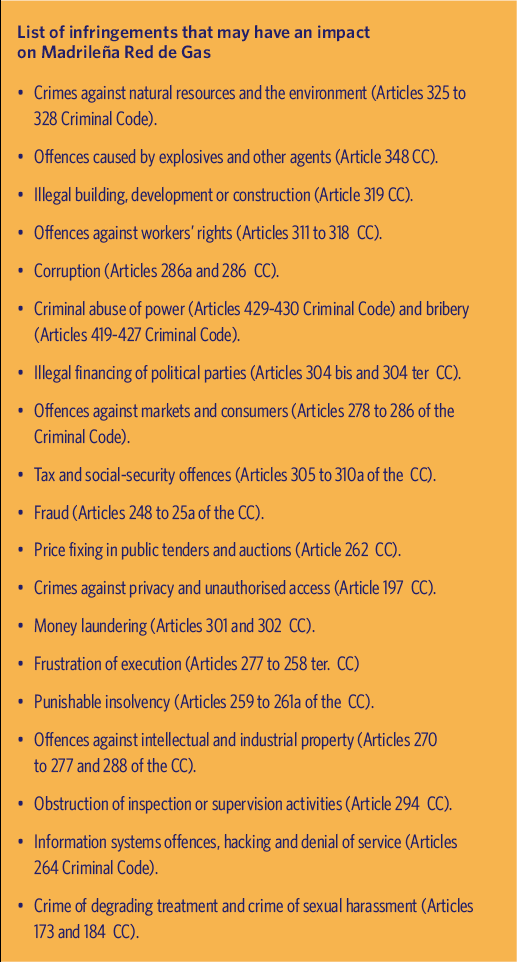
Level of coverage of assessments
Control assessments are managed using specific Compliance Risk Management software, thus allowing the submission of assessments for control implementers and owners.
For each assessment, the system asks control implementers and control owners to attach the established requirements, evidence for each control and to answer specific questions on control design and effectiveness, as well as to report possible control issues.
The fact that all 124 control assessment processes initiated in the system have been fully completed is a continuation of the improvement achieved over the last three years as the compliance assessment coverage target has been met.
Likewise, over the past three years, 100% compliance and optimal adequacy of risk-management controls has been maintained in all processes, and no inadequate or partially adequate controls have been identified.
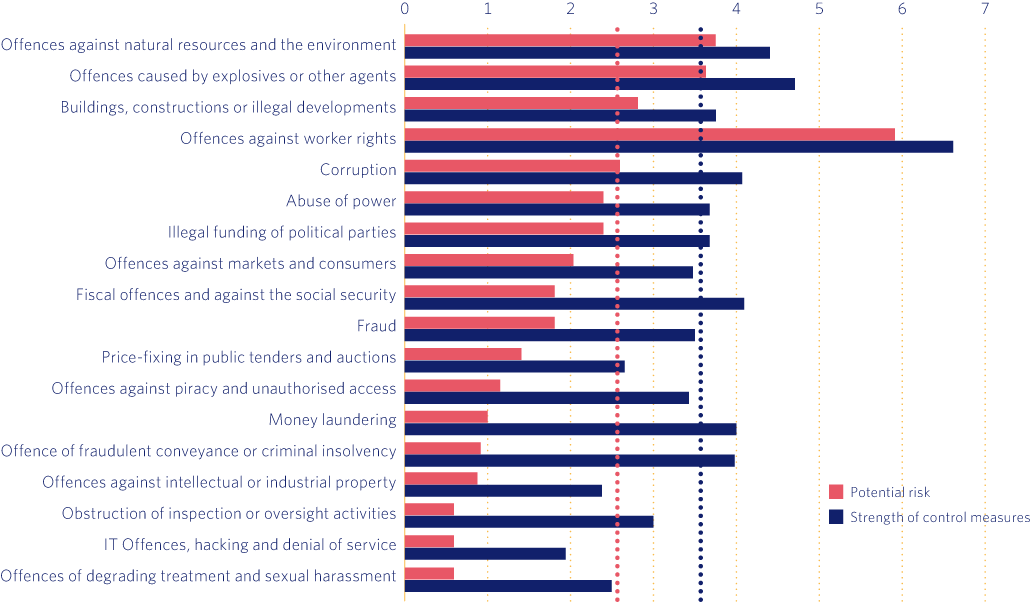
Update of the compliance risk assessment
The assessment of compliance risk related to the offences included in the Company’s risk map has been updated to reflect our current exposure to the risk of verification of behaviour and conduct that may involve a breach of the corresponding regulations and which may entail liability for Madrileña Red de Gas.
The assessment of the potential risk of infringement for all possible offences has been carried out by estimating the likelihood and potential impact of the verification of non-compliant behaviour and conduct. The combination of probability and impact together make up the potential risk of crime.
The results of the assessment process define the potential risk of violation, as updated in the system.
As a result of the analysis carried out, the following points should be highlighted:
- The strength of all control measures outweighs the potential risks, which is very positive.
- With regard to “Infringements against workers’ rights”, which represents one of the most relevant potential risks for Madrileña Red de Gas, the improvement of controls has increased so positively that the gap existing in recent years between the potential risk and the strength of the control has disappeared.
This improvement was achieved in 2021 and continued in 2022 and 2023, mainly due to the work done with implementers and controllers to better define each control to increase its robustness and, in particular:
- Ensure full compliance with current health and safety legislation.
- Guarantee safe and healthy working conditions.
- Implement a sustained process of evaluation and improvement via audit processes:
- Internal and external audits for the maintenance of ISO 45001 certification relating to Occupational Risk Prevention.
- The voluntary and extraordinary audit on Occupational Risk Prevention provided for in Royal Decree 39/1997, of 17 January, which was carried out in September 2021 and is scheduled to be carried out again in 2024 (on a triennial basis).
Update of Risk Matrix and compliance controls:
- The Crime of degrading treatment and crime of sexual harassment were included for the first time in 2022, as established in current legislation (Organic Law 10 /2022 on the integral guarantee of sexual freedom) regulating the duties of prevention and awareness in the workplace. As a result, and as part of the “Equality Plan”, a protocol for action in the event of sexual harassment and other behaviours has been negotiated and approved between the Company (HR) and the Workers’ Representatives and, consequently, new controls have been included in the Compliance Risk Management tool to prevent the commission of this type of offence and behaviour against sexual freedom and integrity.
- New controls have been included in accordance with legislation, and internal policies (Equality Plan) have been approved to promote working conditions that prevent the commission of crimes and other offences in the workplace.
- It should be noted that, in order to promote an adequate framework of protection for workers against the occupational risks associated with potential situations of harassment and violence in the workplace, we have had a specific procedure in place since March 2013. Our Code of Ethics strongly condemns this type of conduct, and compliance with the principles and values set out therein is mandatory. We have adequately designed the company organisation according to the general recommendations for the prevention of psychosocial risks. We also carry out training and information activities on the prevention of psychosocial risks and conflict resolution, especially aimed at team leaders, so that they can recognise and tackle possible conflicts at their source. During 2023 we had no cases of harassment and violence in the workplace.
- A new compliance training programme for all employees is also scheduled to be implemented in 2024.
The information and actions to be taken from this process were assessed by the Audit and Risk Committee, as well as by the Board of Directors, at the March 2023 meeting, as discussed in the Governance, Ethics and Compliance chapter.
Compliance, awareness and training culture
During the year 2023, we have implemented an Annual awareness and training plan on the culture of compliance through different communication actions, including the whistleblowing system, dissemination of learning and information pills on key aspects of the Compliance System. It is very important for the Madrileña Red de Gas compliance team that all employees are aware of the whistleblowing system, and this requires continuous communication. New employees, for example, are informed about the whistleblowing system at the welcome session, and there are also regular information campaigns (e.g. emails, posters) throughout the year.
Anti-corruption policies and procedures: communication and training
- The 123 employees of Madrileña Red de Gas (100% of the workforce) are informed of the anti-corruption policies and procedures, crime-prevention policy, code of ethics and disciplinary system at the time of their implementation, which is periodically reinforced.
- The Criminal Offences Committee, as the body responsible for approving the crime-prevention and anti-corruption policies, the crime-prevention protocol, the annual compliance review report and the annual action plans with the needs detected, among others, is also responsible for the deployment, where appropriate, of general and specific training actions on the prevention of criminal offences, aimed at the executive governing bodies of our company (General Manager, Area Managers and Department Heads), as well as the rest of our employees, since the objective of compliance training is to ensure that all employees and all executive governing bodies of the company fulfil their role and job in a manner consistent with the organisation’s compliance culture, in accordance with the criteria approved by the Board of Directors.
- In addition to being trained in Good Governance Practices (see Board competency assessment charts), Board members are systematically informed at meetings of the Audit and Risk Committee of the policies, the compliance risk assessment and the annual review of the system. The new members who joined in the last quarter of the year have participated in the information in the meeting held in the last quarter of 2023, as discussed in the Governance, ethics and compliance chapter.
The following specific training was provided in 2023:
- Basic compliance training: basic training on prevention of criminal offences provided to all staff regardless of their professional category and hierarchical level, which is currently provided on joining the company as part of the induction plan. The course lasts one hour and is given online. The effectiveness of the training is recorded by passing a questionnaire on the knowledge acquired. In 2023, this training was given to two people (1.6% of staff) not belonging to the Management Committee.
- Criminal compliance training. In 2023, an external reinforcement and refresher course on the Prevention of Criminal Offences was held for 91.9% of staff (113 people)((los números y porcentajes no cuadran. Si dos personas son 2%, 113 personas no pueden ser 92%)). The course was delivered online and the effectiveness of the training was recorded by completing a questionnaire on the knowledge acquired. It is worth noting that 100% of management completed this course.
- Training on the new Sexual Harassment Prevention Protocol: this year we trained 88 people (72% of the staff), during the month of November 2023, for one hour online; this is planned for remaining staff in 2024.
- Reinforcement of communication at team days throughout the year.
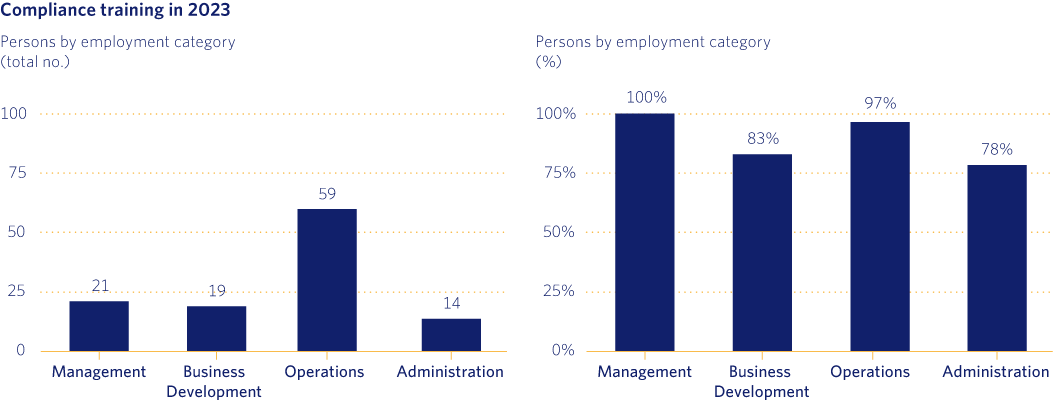

Similarly, all suppliers and contractors are informed and required to comply with the law at all levels, through the clauses on legal compliance and criminal liability.
3.4 Transparency and communication
As part of our commitment to transparency and accountability, we aim to build a framework of trust with our stakeholders by strengthening and maximising the established channels of communication, ensuring transparency in relations, and sharing accurate, appropriate, relevant, clear and useful information, without undermining the integrity of the information given as part of our regulated activity.
Shareholder relations are conducted through the Shareholders’ Meeting and through the Board of Directors, and in non-systematic meetings where their concerns, interests and needs are conveyed and used as a vehicle to communicate and evaluate the deployment of our strategy and the company’s performance. It should be noted that, during 2023, meetings were held outside the regularly established framework, mainly aligned with PGGM’s requirements on sustainability.
In addition, we have an investor website, where relevant information in English for debt investors, other financial creditors and financial analysts, ranging from details of debt financing and credit ratings to our financial results, sustainability reports or links to key regulatory institutions, as well as a direct online channel to our organisation, can be found. On the other hand, during the process of the company’s dual materiality analysis, these bodies were invited to participate by channelling their opinions and interests.
In 2023, we have strengthened the communication content of the Madrileña Red de Gas website for all our stakeholders. Thus, the sustainability website (https://madrilena.es/sostenibilidad/) has been updated and enhanced, disseminating our commitment and regulatory framework in terms of sustainability (policies, code of ethics, etc.). As a relevant event this year, dissemination of the sustainability performance for the previous year (2022), which summarises the company’s main ESG indicators, can be highlighted.
In addition, we publish our Sustainability Report according to the “Global Reporting Initiative – GRI (en)” standard, which contains all the most relevant information on the company’s non-financial matters, including that relating to the new specific requirements for companies in the oil and gas sector, and which complements the information contained in the Annual Report, on this website annually. The sustainability report has been verified by an independent third party.
Concerns about business conduct are also addressed through our whistleblowing channel.
In addition, and in line with our commitment to sustainability, we respond to the interests, needs and expectations of our stakeholders by way of their participation in the analysis of material issues and the satisfaction surveys that are systematically carried out with our main stakeholders. We also disseminate our performance and practice of socially responsible policies through the publication of financial and non-financial information, as well as sustainability assessments and external ratings by accredited bodies.
Another channel of communication and dissemination to all our stakeholders, and in particular to opinion leaders, is the website press room, and our active participation in social networks (LinkedIn, Facebook, WhatsApp groups…) where, in addition to responding to the needs and expectations of our stakeholders, we disseminate news on the company’s progress, energy transition, renewable gases, relevant projects and initiatives, recommendations for our customers, etc.
On the other hand, our communication channels and spaces for dialogue with our stakeholders allow them to raise complaints, advice and concerns about our business conduct and the impact of our activities, such as, for example, dialogue with communities to improve social licence, the call centre and virtual office, the intranet, the irregularities channel or the whistleblowing channel for any legal or due diligence non-compliance. The mechanisms regulating these channels are reflected in the corresponding chapters of this report.
